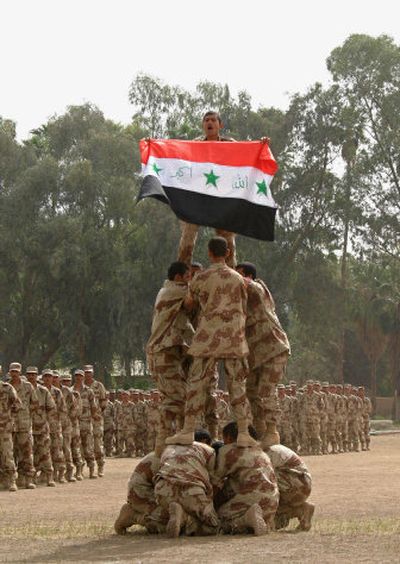Armed groups meet Talabani

BAGHDAD, Iraq – President Jalal Talabani met with representatives of seven armed groups and is optimistic they may agree to lay down their weapons, his office said Sunday. It was the first time a senior Iraqi official has acknowledged talks with insurgents.
However, Talabani did not identify the groups or specify when and where the meeting took place. The spokesman of one major insurgent group, the Islamic Army in Iraq, said his organization had not taken part in such a meeting.
Last year Talabani offered to talk with insurgents, but it was unclear if any took up the offer. U.S. officials have acknowledged meeting Iraqis who had ties to Sunni Arab insurgents but not with representatives of those groups.
American diplomats have also cautioned that any such dialogue could take a long time to end the fighting because of divisions within insurgent ranks, which include Islamic extremists such as al-Qaida in Iraq who show no sign of wanting to end their jihad, or holy war, against the Americans and their Iraqi partners.
It was also unclear whether the seven groups represented a substantial portion of the insurgency. Talabani also did not say whether the insurgents presented their own demands.
“I believe that a deal can be reached with the seven armed groups that visited me,” Talabani was quoted as saying. The statement said Talabani made the remarks Saturday during a meeting with fellow Kurds in the Kurdish self-ruled region of northern Iraq.
U.S. Ambassador Zalmay Khalilzad has been anxious to establish a dialogue with insurgents except for Islamic extremists such as al-Qaida in Iraq and Saddam Hussein loyalists. U.S. officials believe a third faction – mostly nationalistic Sunni Arabs – might be willing to cut a deal if they feel Iraq’s new national unity government serves their interests.
According to the statement, Talabani said al-Qaida in Iraq, led by Abu Musab al-Zarqawi, had declared a “genocide against the Iraqi people.”
“But there are groups other than the Saddamists and Zarqawists who joined armed operations to fight the occupation, and we are trying to establish a dialogue with them so they will join the political process,” he said.
Talabani’s security adviser, Lt. Gen. Wafiq al-Samaraei, told Al-Arabiya television that the dialogue was aimed at driving a wedge between religious zealots and other insurgents.
American officials hope the new leadership of Shiites, Sunnis and Kurds will manage to calm sectarian tensions and lure disaffected Sunni Arabs away from the insurgency. That would enable the United States and its international partners to begin leaving Iraq.
Prime Minister-designate Nouri al-Maliki hopes to name his Cabinet – the final step in organizing the new government – by May 10, Iraqi officials said. Negotiations are under way to fill key posts, including ministers of defense, interior and oil.
In an interview Saturday with National Public Radio, Khalilzad expressed skepticism that al-Maliki would finish by his self-imposed deadline. He has until late May to complete the task.
The first all-Sunni class finished its basic training Sunday in Habaniyah, 50 miles west of Baghdad. After the graduation ceremony, some of the 978 new soldiers began shouting and arguing when they learned they would have to serve in Ramadi and other dangerous parts of Sunni-dominated Anbar province instead of their hometown of Fallujah.
Some soldiers also complained they had not been paid. Basic training lasts four weeks for Iraqi troops compared with nine weeks in the U.S. Army.
Also Sunday, the Iraqi Defense Ministry said Iranian forces shelled Kurdish rebel positions near the Iraqi town of Haj Omran, about 180 miles northeast of Baghdad. There were no reports of casualties. Iranian Kurdish rebels maintain bases near Haj Omran.